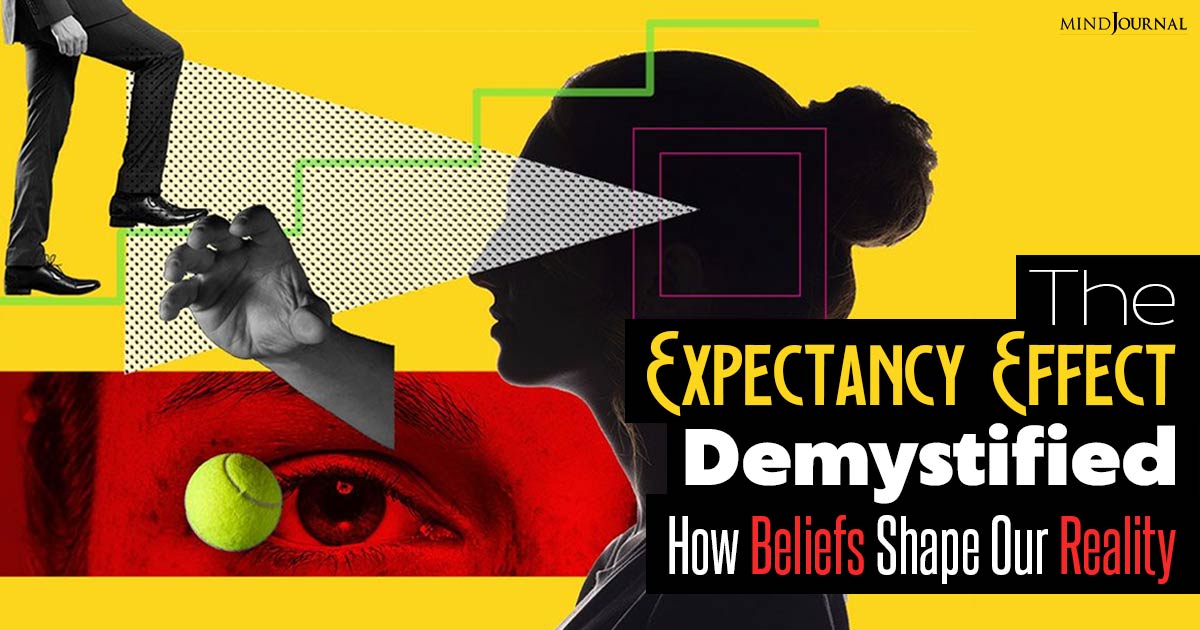Have you ever wondered why some people seem to always succeed while others struggle to achieve their goals? The answer may lie in the expectancy effect – a psychological phenomenon that can influence our behavior and outcomes. Let’s explore expectancy effect meaning and how it can play out in real life.
What is the expectancy effect?
Have you ever heard of the phrase “self-fulfilling prophecy“? It’s a concept that refers to the idea that our beliefs and expectations can influence our actions and ultimately shape our reality.
This idea is closely related to the expectancy effect, which is a phenomenon in psychology that describes how our expectations can influence our behavior and outcomes.
Expectancy effect definition: The expectancy effect, also known as the Pygmalion effect or the Rosenthal effect, refers to the phenomenon in which a person’s expectations about another person or situation can influence that person’s behavior and ultimately shape the outcome of the situation.
This effect is often studied in the context of education and workplace performance, but it can apply to any situation where expectations are involved.
Expectancy effect psychology suggests that when people have high expectations for someone, they tend to treat them differently than they would if they had low expectations. This difference in treatment can lead the person to behave in a way that meets the expectations, thereby reinforcing the original beliefs.
On the other hand, when people have low expectations for someone, they may not provide the same level of support or encouragement, which can lead the person to underperform.
Related: 8 Things You Should Stop Expecting From Others
Understanding expectancy effect meaning
When we hold strong beliefs or expectations about something or someone, we tend to behave in ways that align with those beliefs. These behaviors, in turn, can influence the person or situation, making our initial expectations come true, even if they were initially false or unfounded.
So, the expectancy effect is when you think something will happen because you believe it will, even if it’s not true. It’s like having a wish that you think will come true just because you really, really want it to. Sometimes, believing in something strongly can make you feel like it’s happening, even if it’s not.

The expectancy effect psychology demonstrates the power of our beliefs and how they can shape our perceptions and behaviors. It’s a reminder to be mindful of our assumptions and biases, as they can significantly impact the outcomes in various aspects of life, from education and work to personal relationships.
Understanding expectancy effect meaning can help us make more objective judgments and create a positive and empowering environment for ourselves and others.
The expectancy effect in education
One of the most well-known expectancy effect example is in education. In a classic study, researchers gave elementary school teachers the names of students who were predicted to have a growth spurt in the coming year.
The researchers found that the teachers treated these students differently than they did the other students, giving them more attention, praise, and opportunities for growth. As a result, the “growth spurt” students performed better academically than their peers.
This study highlights how the expectancy effect can play out in the classroom. When teachers have high expectations for their students, they are more likely to provide the support and resources needed for those students to excel.
However, when teachers have low expectations for their students, they may not provide the same level of support, which can lead to lower academic performance.
The expectancy effect in the workplace
The expectancy effect psychology can also play a significant role in the workplace. When managers have high expectations for their employees, they may provide more opportunities for growth, more challenging assignments, and more recognition for good performance. This can motivate employees to work harder and achieve better results.
On the other hand, when managers have low expectations for their employees, they may not invest as much in their development or provide the same level of recognition for good performance.
According to expectancy effect definition, this can lead employees to feel demotivated and undervalued, which can ultimately lead to lower productivity and performance.
Related: The Key To Bliss: Let Go Of Expectations and Avoid Suffering
The expectancy effect in sports
The expectancy effect meaning can even apply to sports. Here’s an expectancy effect example –
In a study of basketball players, researchers found that coaches’ expectations of their players’ abilities could influence their actual performance.
In the study, coaches were told that certain players were “superstars,” even though their actual ability was no different than the other players on the team. The researchers found that the players who were labeled as “superstars” performed significantly better than the other players, even though they had no inherent advantage.
This study illustrates how the expectancy effect can influence performance in sports. When coaches have high expectations for their players, they may provide more opportunities for development and give them more playing time, which can lead to better performance.
Conversely, when coaches have low expectations for their players, they may not provide the same level of support and opportunities for growth, which can lead to lower performance.
How to avoid negative expectations
Understanding expectancy effect meaning makes you realize that this phenomenon can be a powerful tool for achieving success, but it can also be a source of negative outcomes.
If you find yourself with negative expectations of yourself or others, there are several things you can do to avoid the negative effects of the expectancy effect.
1. Be aware of your expectations
If you find yourself expecting someone to fail, try to reframe your expectations in a more positive light. For example, instead of thinking, “I don’t think they can do this,” try thinking, “I believe they can do this if they put in the effort.”
2. Be mindful
It’s important to be mindful of the way you treat others based on your expectations. If you find yourself treating someone differently because of your expectations, try to adjust your behavior to be more supportive and encouraging.
3. Realize that others factors are also at play
Finally, it’s important to recognize that the expectancy effect is not the only factor that influences outcomes. Other factors, such as motivation, ability, and external circumstances, can also play a role in determining success or failure.

Takeaway
The expectancy effect is a powerful force that can influence our behavior and outcomes. By understanding how our expectations can shape our reality, we can use this knowledge to our advantage and achieve our goals.
Remember, our expectations can be self-fulfilling prophecies. Therefore, it’s essential to be aware of our expectations and their potential impact on ourselves and others. By setting high expectations and providing support and encouragement, we can create a positive environment that fosters growth and achievement.
Let’s use the power of the expectancy effect to our advantage and create a better future for ourselves and those around us.
Related: How to Be Happy, Even When You Least Expect It
Frequently Asked Questions (FAQs):
What is the expectancy effect?
The expectancy effect is when beliefs or expectations about a person or situation influence behavior and outcomes.
What is the expectancy effect example?
An example of the expectancy effect is a teacher’s belief in a student’s potential leading to improved academic performance.
What are other names for expectancy effect?
Other names for the expectancy effect are the “Rosenthal effect”, the “Pygmalion effect” and the “self-fulfilling prophecy.”









Leave a Reply
You must be logged in to post a comment.